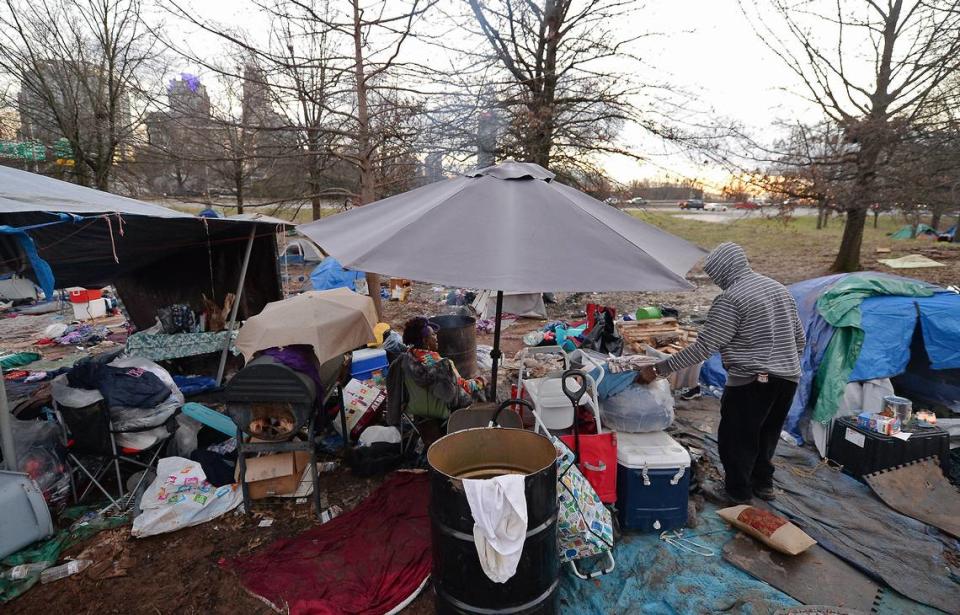The tents are gone. The need remains. 200+ people moved from Charlotte homeless camp.
When the deadline to clear the tent encampment arrived, it was a more subdued scene than the harried week that preceded it would have suggested.
Shortly before 5 p.m. Friday, the homeless camp just outside uptown Charlotte mostly was left with deserted tents and debris. Nearly everyone was gone, either into one the county’s offered hotel rooms or having slipped away to another unsheltered area.
A small army of volunteers helped load vehicles and marshal supplies as nearly all of the residents had left ahead of a county order to clear the camps of a pervasive rat infestation.
By Friday afternoon, county staff, nonprofits and grassroots groups had moved more than 200 people to a hotel room, County Manager Dena Diorio said.
As quietly as the deadline passed, the preceding days were anything but.
It began Tuesday evening with an abruptly-announced county health order, followed by plans for a rapid removal and public bickering among government leaders over responsibility for relocation of a vulnerable community.
About 15 to 20 people remained on site as of 2 p.m. Friday, according to a canvassing of the area by Roof Above.
“This is a community problem and I am extremely proud and humbled by the support we have received from the community,” Diorio said.
She thanked area shelter providers and community organizations that helped with the relocation, as well as taxi services who helped get people to the hotels, free of charge.
The relocation efforts were meant only for those with previous ties to the encampment, Diorio said, and the plan was not capable of solving overall homelessness in Mecklenburg.
But in a sign of the area’s pervasive need, 12 families with no ties to the camp showed up needing a hotel room, she said, and were referred to the Salvation Army for shelter.
County officials said they had no firm count of those who turned down a hotel room or left to camp elsewhere.

A home in ‘Tent City’
Conditions at the tent encampment on the north edge of uptown have deteriorated in recent weeks, though the loose affiliation of tents has been growing for a year, as the pandemic heightened economic instability and drew more people close to resources like the nearby day services center run by Roof Above.
The clusters of tents, tarps and personal belongings grew for months, in contrast to the gleaming skyline just on the other side of Interstate-277.
And then, the order this week ended nearly all of it, with concerns from some community groups that the removal was too fast, despite the county’s assertion the infestation was a dire public health concern.
“The last few hours, like the last three days, have been extremely stressful,” said Jessica Lefkowitz, founder of Hearts for the Invisible Charlotte Coalition, one of the groups working on the effort. Many of those working on the ground expressed gratitude that many people who had spent months outside in increasingly unsanitary conditions, were going to sleep in a bed Friday night.
Still, the rushed maneuver to shut down the camp — a place some called an eyesore, the county’s order deemed a “nuisance,” and many in Charlotte simply named “Tent City” — exacted an emotional toll for the people who’d arrived there and called this place home.
“It’s been a very traumatic process for a lot of people,” Lefkowitz said.
The next few days, she said, will be spent assessing people’s needs to replenish essential items or things that were left behind at the camps.
“It’s our mission to make this transition as easy as possible for our neighbors,” she said.
What happens now?
The most immediate action now will come from the property owners covered under the order: Roof Above, NC Department of Transportation, the city of Charlotte, Morningstar Storage and wireless communications company American Towers.
They’re now required to find pest control services and ensure their properties are clean within 72 hours of the Friday deadline, and then submit an eradication plan to the county for approval.
No one is allowed to return to the site to camp during the infestation removal process, according to the county’s order.
Beyond that, many community groups are calling on government leaders to invest in long-term solutions for permanent housing beyond the initial 90 day hotel stays.
The hotel rooms and related services will be paid for with a combination of FEMA funding and money routed to Mecklenburg County from the federal coronavirus relief package.
While no plans have been released publicly, Diorio alluded to plans during a Thursday news conference. The county is exploring a number of options, she said, including some type of “tiny houses” and the use of county owned land.
Quest to clear Charlotte homeless camp: Officials squabble. Residents face uncertainty.
Here’s how to help people affected by closure of uptown homeless camp in Charlotte
Despite drop in Charlotte COVID cases, positivity rate still higher than NC average

